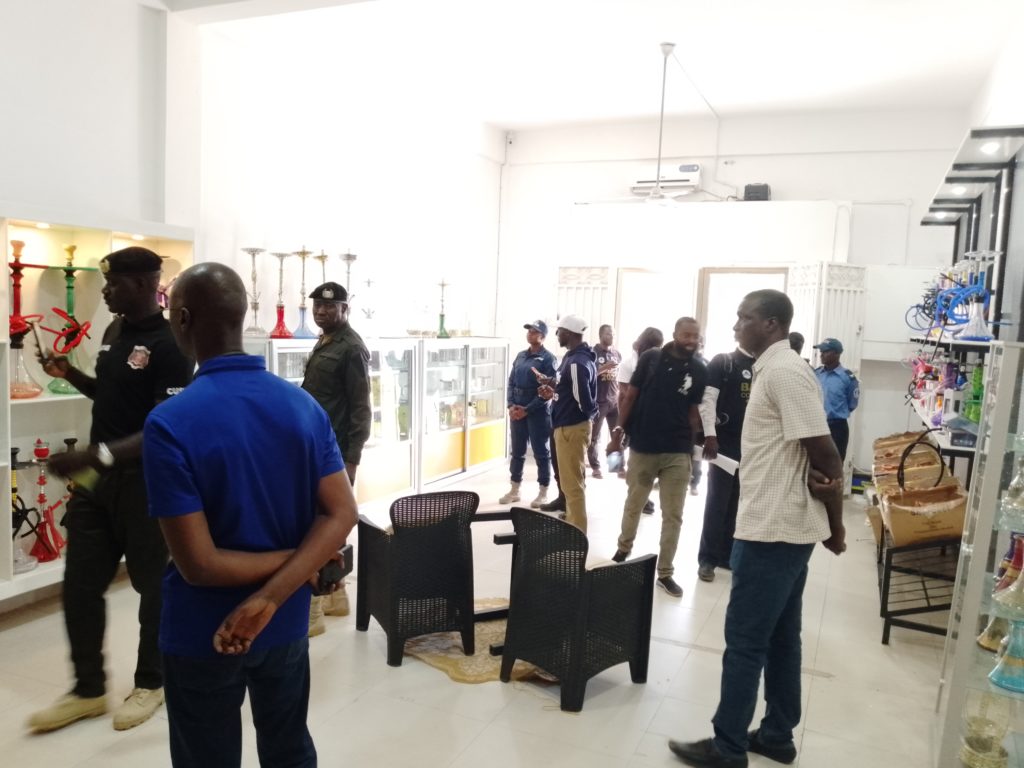Tobacco Control Taskforce Confiscate Shisha, and Cigarette From Shops And Restaurants

By Landing Ceesay
The Tobacco Control Taskforce confiscated Shisha and cigarettes from shops and restaurants within the Kanifing Municipality (KM) for violation of the Tobacco Control Act.
In June 2021, The Gambia Police Force (GPF) announced that a joint operation by the Police, GRA-Customs, Public Health, and Environmental Inspectors has been set up to enforce the Tobacco Control Act and Regulations in the country.
The Tobacco Control Act has banned public smoking, display of tobacco products, selling of single sticks, and advertisements of tobacco products as well as Shisha.
The Taskforce in their recent operation confiscated shisha products and cigarettes from shops and restaurants within the KM.
The Taskforce also closed down a vape shop for violation of the Tobacco Control Act by publicly displaying the products for advertisement.
Commissioner Pa Samba Bojang, Head of the Tobacco Control Operation, told Kerr Fatou that they are enforcing the law as it is written in the Tobacco Control Act.
“With regard to this operation, it is a follow-up of 3 months back operations in which we did some sensitization and community outreach to engage those involved in the Tobacco products business. But we found that few among them refused to comply with the law. That’s why this time we confiscated their products and if the need arises, we will prosecute them,” Commissioner Bojang told Kerr Fatou.
Commissioner Bojang said that despite confiscating some tobacco products, the business community has been largely compliant with the law, especially in the retail sale of tobacco products. He added that the retail sale of tobacco products has decreased significantly since the operation began months ago. However, Commissioner Bojang acknowledged that they are still facing challenges with the sale of shisha and other tobacco products.
Commissioner Bojang downplayed the potential negative impact of senior officers’ interference on operations, describing it as a normal occurrence.
“Actually, it is normal. You know, the Gambia is a small country, everybody is everyone. You either be known or be connected. Those whom he called were law enforcement officers, they realized our efforts and complied with our communication. So, I believe calling those people will be linked to their relationship with them, they will not interfere much with our operations. Because I was the one who communicated with them,” he said.
Meanwhile, Omar Badjie, focal person of Non-Communicable Disease Prevention and Control Programme Manager and the National Focal Point, said the confiscation is a step in the right direction.
“The team went around and did the inspection accordingly, and confiscated some of the items we found wanting, and we have covered a lot of areas. This is a big plus for us. We thank God that the owners of the premises are very cooperative with us, and this is what we are looking for. The law is there to implement, and we are not using any force. If all the premises owners were cooperative with us as we experience today. It will smooth our work and that’s what we are looking for,” he said.
Like Commissioner Bojang, Mr. Badjie also admitted interference from senior Police Officers in their operations.
“We are doing our best, though the road is not yet smooth as we wanted it to be. Because we have a lot of interference, especially from the top brass. A lot of people are calling all angles anywhere we go to, especially these big shops. Those people are also calling us, but we are expecting those things to happen.
“Of course, it has a negative impact, but we are there to make sure that we counter all those interferences. That is our mandate and that is our responsibility. In the implementation of the law anywhere in the world, you must expect interference. You must expect the unexpected in the implementation of the law,” he said.

